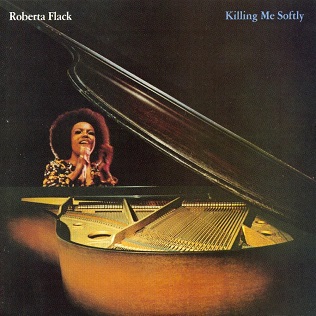
Key Tracks:
Killing Me Softly with His Song, Jesse and I'm the Girl are what people expected to hear when they bought this record. Suzanne is also an interesting exploration.
Obvious Filler:
None, but there are a few marvelous swings-and-misses. Let me clarify. A filler track is a track that was added simply to fill time and has no artistic dedication. A swing-and-a-miss is a track where the artist was obviously reaching for something but didn't make it (often in spectacular fashion).
My Overall Rating of the Tracks Separately:
Above Average (2.5/4 stars)
On this record, there's never any attempt to hide the fact that its richest asset is the title track. So, understandably, that's how it all kicks off. Everybody knows Killing Me Softly with His Song because everybody should - it's one of the most powerful vocal performances of the seventies. The unabashed vulnerability of Roberta's delivery is a fragile treasure. That vulnerability deepens with track two - the Janis Ian cover Jesse. It's just as exposed, but it feels more substantial and somehow more raw - possibly because it forgoes the cheesy synth of the previous track and replaces it with a traditional string arrangement. Jesse feels like it could have been recorded in the forties (or any other decade thereafter) and has a timeless quality to it. And in those moments, Roberta Flack is unmatched. She is phenomenal when she lays bare her soul.
Unfortunately, that is also a hindrance in some scenarios. The next track, No Tears (In The End), is an uptempo, bombastic R&B number. It calls for a Gladys delivery, if not a full-on Aretha. But Roberta Flack never plays anything that way. Her voice far too restrained for what the song demands, especially when it's competing with horns and a proto-funk rythm section.
She does regain her footing on I'm the Girl, but sadly, that's the last torch song on the LP. The B side starts by repeating the misguided R&B pattern with another great song by a great R&B songwriter falling short due to an incongruous vocal. Then everything takes a slide. Flack seems to be trying to capture the pop zeitgeist at the time with the remaining tracks. All of the lounge-sound stereotypes of the seventies make an appearance on When You Smile and Conversation Love. (By the way, Conversation Love is the only track which gets its lyrics printed on the album cover for some reason I have yet to discern because they are not good lyrics. "Throw sad reflections to the wind where they belong / Surprising things will rise to the top." Huh?) But somehow, Flack does manage to strike a perfect balance of the two very distinct pop sounds she is recording between - the psychedelia of the late sixties and the disco of the mid-late seventies - with the closing track, Suzanne. Even more astounding, she does it with a nine-minute-plus cover of a Leonard Cohen song. That is no small feat.
So, is it an album?
No. It's not because of the seven different arrangers she brought in for the eight song LP. It's not because the title track was recorded and mixed completely separate from everything else. It's not because it was recorded over a two-year period. It's because of a clear lack of identity. On "Killing Me Softly," Roberta Flack tries to bounce from chanteuse to soul queen to pop diva while only ever seeming truly comfortable in one of those roles.
Up next, "The Grand Illusion" by Styx (1977).
No comments:
Post a Comment